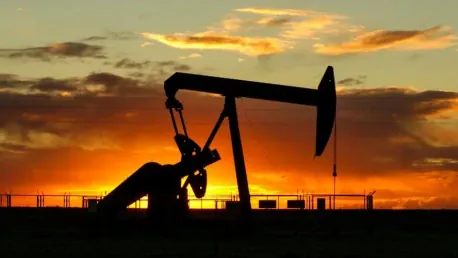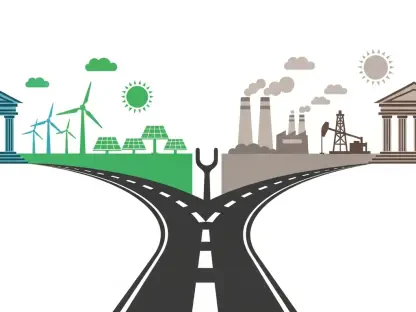A heated legal challenge in Edinburgh may profoundly impact the future of two significant untapped oil fields in the UK: the Rosebank oil field and the Jackdaw gas field, both located offshore near Scotland. This development sees environmental groups, Greenpeace and Uplift, initiating a judicial review to halt these projects due to serious environmental concerns, particularly emissions resulting from fossil fuel extraction and consumption. The legal action reflects broader tensions as the UK navigates its energy policy, balancing economic benefits with pressing climate goals.
Environmental Groups’ Legal Challenge
Greenpeace and Uplift argue that the approval process by the North Sea Transition Authority (NSTA) was fundamentally flawed as it failed to adequately consider the substantial greenhouse gas emissions, known as Scope 3 emissions, associated with these projects. Scope 3 emissions refer to the emissions resulting from the burning of the extracted oil and gas. Ruth Crawford KC, representing Greenpeace, insisted that ignoring these emissions constitutes a “legal error,” especially since the UK government had already acknowledged this oversight based on a Supreme Court ruling earlier in the year.
Crawford emphasized the necessity of re-evaluating the environmental impact by incorporating Scope 3 emissions before proceeding with the projects, framing this omission as a significant legal oversight. She highlighted the importance of considering the long-term climate impact of these fossil fuel projects instead of focusing solely on immediate economic gains. According to Crawford, politicians should weigh the environmental and health risks tied to substantial emissions. The environmentalists are determined to ensure that any future development does not proceed without a comprehensive review of its long-term climate implications.
Companies’ Defense of the Projects
Contrarily, the companies involved, including Equinor and Ithaca Energy, defend the projects by stressing their crucial role in enhancing the UK’s energy security and generating employment. Equinor, a Norwegian energy giant, claims that the Rosebank project will result in 1,600 jobs during its construction phase and support 450 UK-based jobs throughout its operational life. Similarly, a Shell representative involved in the Jackdaw project argued that the development is essential for meeting the UK’s energy needs, as it would supply enough gas to heat 1.4 million homes, particularly as older gas fields continue to deplete.
These companies assert that their projects have already secured necessary permits and complied with all regulations. Nonetheless, if the environmentalists’ legal challenge succeeds, it could compel the operators to conduct new environmental impact assessments, potentially causing delays or necessitating redesigns to meet stricter environmental standards. The companies maintain that their adherence to regulatory frameworks validates the projects’ continuation, underscoring the necessity to proceed for the nation’s energy stability and employment provisions.
Government’s Position and Commitments
Officially, the UK government has committed to maintaining oil and gas as integral components of the economy for the foreseeable future while simultaneously facing pressure to achieve climate goals and transition towards renewable energy. In August, the government conceded that its initial approvals for the Rosebank and Jackdaw projects were flawed and indicated the possible need for a more comprehensive environmental assessment. Meanwhile, the Scottish government, which aims for net-zero emissions by 2045, has consistently opposed further oil and gas exploration. However, First Minister John Swinney acknowledged in June that some dependence on oil and gas would persist to facilitate the transition to renewable energy sources.
The governments have refrained from commenting directly on the ongoing legal matter, as it is currently under judicial review. The outcome of this legal challenge has the potential to significantly impact the UK oil and gas industry. A favorable ruling for the environmental groups would require new assessments that fully consider the long-term emissions impacts, potentially leading to delays or changes in project designs aimed at meeting higher environmental standards. The government’s position reflects a delicate balance between advancing immediate energy needs and addressing long-term climate commitments.
Broader Implications for UK Energy Policy
A significant legal dispute in Edinburgh could dramatically influence the future of two major untapped oil and gas fields in the UK: the Rosebank oil field and the Jackdaw gas field, both situated offshore near Scotland. Environmental groups, Greenpeace and Uplift, have launched a judicial review aimed at stopping these projects due to substantial environmental concerns. Their primary worry is the emissions from fossil fuel extraction and consumption. This legal action is emblematic of the larger struggle the UK is facing in its energy policy, as it attempts to find a balance between the economic advantages of continuing fossil fuel projects and the urgent need to meet climate goals. This situation underscores the ongoing debate about sustainable energy futures and the commitment to reducing carbon footprints while considering the nation’s economic interests. The outcome of this legal battle could set a precedent for how the UK addresses future energy projects amidst growing climate change concerns.









